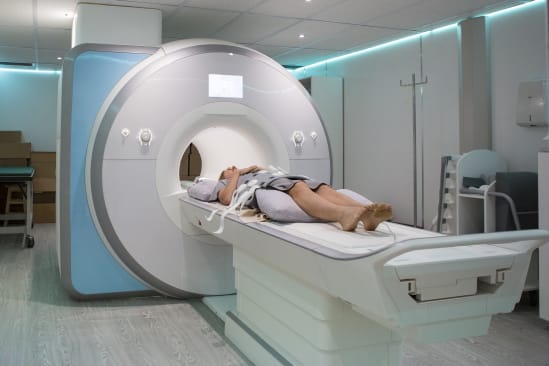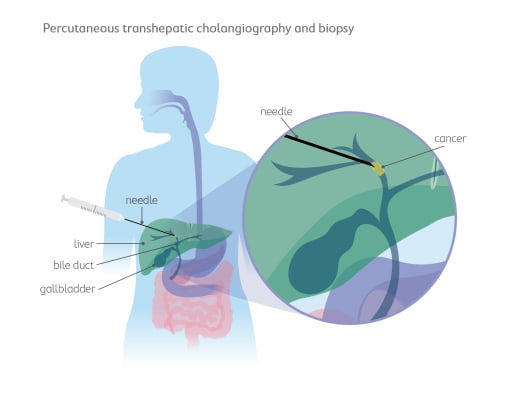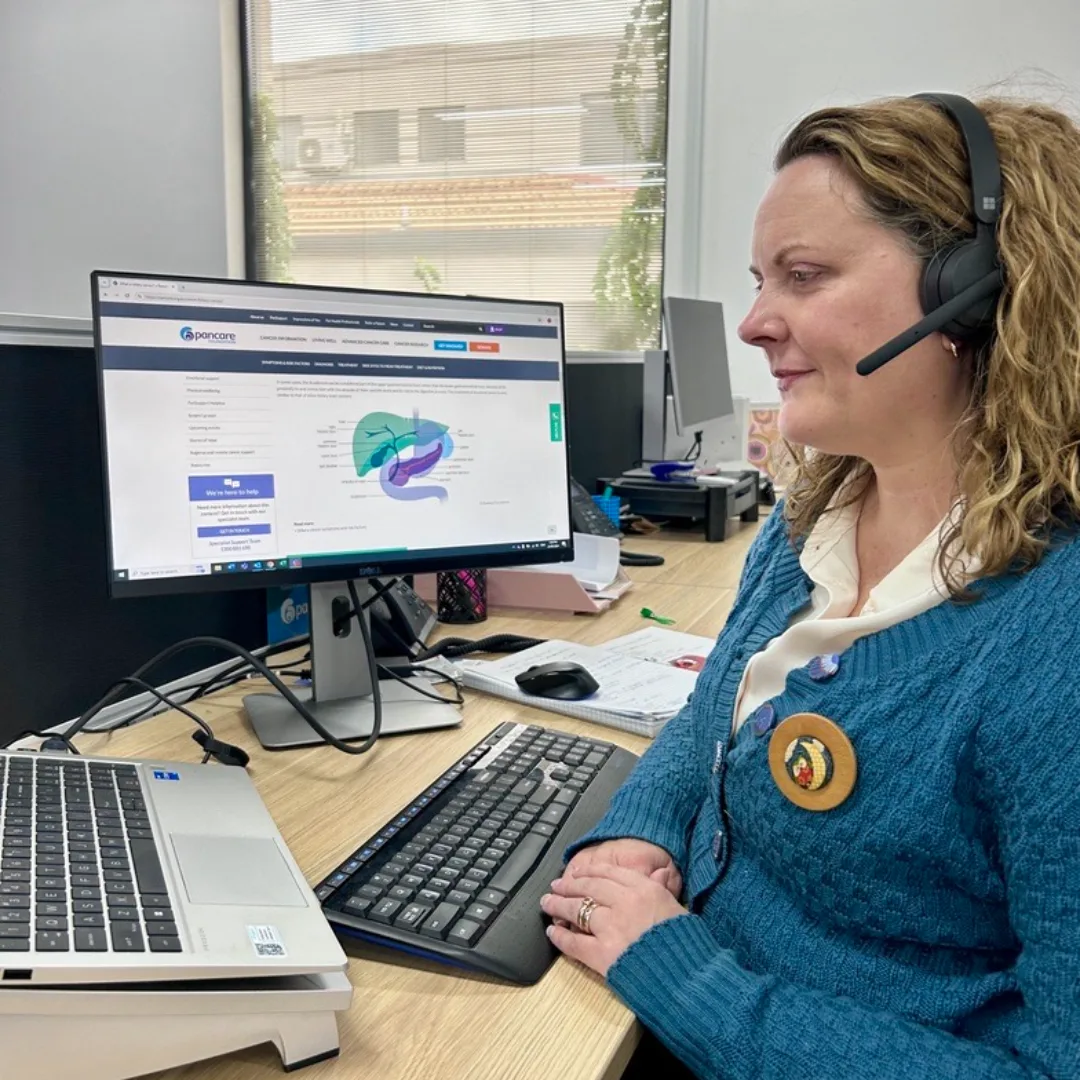Tests and diagnosis
You may need to have several tests when you are being investigated for biliary cancer. These tests help your healthcare team understand whether there are cancer cells in your gallbladder or bile ducts, what type of cancer it is, and whether it has spread to other parts of the body. This information is vital in planning the most effective treatment for you.
It can take time to complete all the necessary tests. Waiting for appointments and results can be stressful. This section explains the tests you might have, what staging means, genetic testing, and what happens when you get your diagnosis.
Tests for biliary cancer
Diagnosing biliary cancer can be challenging and often needs several different tests. Your specialist will choose the best tests for you. You may not need all the tests described here.
Physical examination
If you go to your doctor with symptoms like pain around your tummy or the right side of the ribs, your doctor may perform a physical examination to check for signs of disease.
A physical examination is a check-up, where your doctor will look for things like lumps, swelling or anything else that seems unusual. They will ask you about your medical history, family history and your health habits.
Blood Tests
Blood tests can check:
- your blood count
- how well your liver and kidneys are working
- tumour markers – chemical substances produced by cancers that show up in the bloodstream.
For example, CA19-9 and CEA are tumour markers linked to biliary cancer. But other health problems can also raise these markers, and some people with biliary cancer have normal levels. So, these markers alone can't tell you if you have biliary cancer.
Scans
Several types of scans may be used to look at your gallbladder, bile ducts and nearby organs.
- An ultrasound uses sound waves to make pictures of your abdomen (tummy). A probe is moved over your abdomen and shows your liver, pancreas, gallbladder and bile ducts on a screen.
- A computed tomography (CT) scan uses X-rays to make 3D pictures of your gallbladder, bile ducts and nearby organs. This scan usually also includes your chest and pelvis to check if cancer has spread. A CT scan is the main test used to diagnose biliary cancer.
- A magnetic resonance imaging (MRI) scan uses magnets and radio waves to make detailed pictures of your gallbladder, bile ducts and the soft tissue nearby.
- A magnetic resonance cholangiopancreatography (MRCP) scan is a special type of MRI scan. It can make clearer pictures of the bile ducts and help see any blockages or narrowing.
- A positron emission tomography (PET) scan uses a small amount of radioactive substance put into a vein. It can help to find very small areas of cancer cells. Not everyone with biliary cancer needs a PET scan.

Special procedures
Some tests for biliary cancer use special equipment.
- During an Endoscopic Ultrasound (EUS), a thin, bendy tube with an ultrasound probe is passed through your mouth into your stomach. This gives close-up pictures of your bile ducts and gallbladder. The doctor can also take a biopsy (small tissue sample) during this test if needed.
- An Endoscopic Retrograde Cholangio-Pancreatography (ERCP) is similar to EUS and uses a bendy tube through your mouth. A thin tube is guided into the bile ducts. Special dye is put in and X-ray pictures are taken to show any blockages or narrowing. During this procedure, a stent (small tube) can be put in to keep blocked bile ducts open. The doctor may also take a biopsy during this test.
- A cholangioscopy is sometimes done at the same time as an ERCP. It is a small tube with a camera that is passed directly into the bile ducts so the doctor can see if there are any abnormal areas. If there are, the doctor may take a biopsy that will be sent to a pathologist for further tests.
- A percutaneous transhepatic cholangiography (PTC) uses X-rays to look for a blockage in your bile ducts. You usually have a PTC if you can’t have an ERCP for some reason. Doctors can also use PTC to plan surgery to remove the gallbladder. The doctor will put a long, thin needle through the skin and into the liver and bile ducts. They will then inject a dye into your bile ducts that shows up any blockage on an X-ray. The doctor may also take a sample of any abnormal-looking areas.

- A laparoscopy is a small operation done whilst you're asleep under general anaesthetic. A long tube with a camera is put in through small cuts in your tummy. This lets doctors see if cancer has spread. Small tissue samples (biopsies) can also be taken during this procedure.
- A biopsy takes a small sample of tissue from your gallbladder or bile duct. The sample is looked at under a microscope to check for cancer cells.
A biopsy can be taken:
- during an ERCP, EUS or laparoscopy
- through your skin using a needle, with the help of a CT or ultrasound scan to guide the needle to the right place.
A biopsy may not be needed if surgery to remove the cancer is planned straight away.
If surgery is not planned at the start, you will need to have a biopsy before starting chemotherapy or taking part in a clinical trial.
Waiting for test results
Results should be ready within one week of having the tests. Waiting can be stressful. If your symptoms get worse while waiting, contact your doctor or go to an emergency department if needed.
Genetic testing
Genetic testing can provide important information about both why biliary cancer develops and how it might best be treated. There are two main types of genetic testing – one looks at the genes you were born with, and the other looks at the genes within the cancer itself.
Genetic testing for inherited gene changes
Inherited genetic conditions that cause biliary cancer are uncommon. Most people who develop biliary cancer do not have a family link. However, a small number of people may carry a change (called a pathogenic gene variant or mutation) that increases their risk.
The genetic changes most often linked to biliary cancer include:
- Lynch syndrome (hereditary nonpolyposis colorectal cancer) – caused by changes in genes that repair DNA, called MLH1, MSH2, MSH6 and PMS2.
- BRCA1 and BRCA2 gene mutations – most commonly linked with breast and ovarian cancers, but can also increase the risk of biliary cancer.
If your doctor thinks your cancer or family history might suggest an inherited cause, you may be referred to a familial cancer service or genetic counsellor.
They can:
- review your personal and family history to determine whether genetic testing is appropriate.
- explain what testing involves, what results might mean, and how they could affect your family.
- provide support with family risk notification and arrange testing for relatives if needed.
Genetic testing is usually offered when there is at least a 10% chance of finding a relevant inherited gene change. Testing usually starts with someone who has already had cancer (called a diagnostic genetic test). If a gene change is found, relatives can be offered predictive genetic testing to see if they have inherited the same variant.
Genetic testing of tumours
Your doctor may also recommend testing a sample of the tumour to look for genetic changes within the cancer cells themselves. This is called molecular profiling or tumour testing.
Unlike inherited testing, these tests look for acquired gene changes that have developed in the cancer, not ones you were born with. These results can:
- help confirm your diagnosis.
- identify specific molecular features (such as mismatch repair (MMR) deficiency) that may suggest an inherited condition and guide further testing.
- show whether your tumour has changes that might make it respond to targeted therapy or other specific treatments.
These tests don’t change your diagnosis, but they help your care team choose the most effective treatment for your particular type of biliary cancer.
Staging biliary cancer
Once biliary cancer is found, your doctors need to work out how far the cancer has spread. This is called staging.
Staging helps your medical team:
- understand how much cancer there is in your body
- plan the best treatment
- predict how you may respond to treatment.
In most cases, the stage of a cancer is based on three factors:
- the location and size of the tumour (T)
- whether or not the cancer has spread to nearby lymph nodes (N)
- whether or not the cancer has spread to distant areas of the body, known as metastasis (M).
These combined factors are known as the TNM staging system.
Your doctor might also use a number between 1 and 4 to describe the stage of your cancer.
Stage 1:
The earliest stage.
For gallbladder cancer, the cancer is found only in the inner layers of tissue lining the gallbladder.
For bile duct cancer, the cancer is small and found only in one area of a bile duct.
Also called localised cancer.
Stage 2 and 3:
For gallbladder cancer, the cancer has grown through the muscle layer of the gallbladder wall and may have spread to nearby tissues and/or lymph nodes.
For bile duct cancer, the cancer is larger and may have grown into the surrounding tissues and to nearby lymph nodes.
Also called locally advanced cancer.
Stage 4:
The late stage.
For both gallbladder and bile duct cancer, the cancer has spread to other parts of the body. This is known as advanced cancer or metastatic cancer.
Sometimes staging can only be fully determined after surgery when the removed tissue is examined.
Can my cancer be removed?
In addition to staging the cancer, your doctors will also describe the cancer based on whether it can be removed with surgery.
Your cancer might be:
- resectable (or operable): This means it can be removed by surgery
- borderline resectable: This means the cancer partly involves major blood vessels. Surgery may be possible after chemotherapy to shrink the cancer.
- locally advanced: This means the cancer has grown around major blood vessels and cannot be removed.
- metastatic: This means the cancer has spread to other organs. At this stage, it cannot be removed with surgery.
Finding out you have biliary cancer
Being told you have biliary cancer is shocking and overwhelming. There is no ‘right’ way to feel – everyone reacts differently. You may feel:
- shock and disbelief
- fear and worry
- anger
- sadness
- numbness.
All of these reactions are normal.
A lot can happen quickly after diagnosis, and you might get lots of information. It's okay if you don't remember everything you're told or need information repeated.
What happens next
After your diagnosis, your medical team will finish any remaining tests that are needed. They will then talk to you about the treatment plan best suited to your situation.
Treatment should start within four weeks of diagnosis, depending on how urgent it is and what type of treatment is recommended.
Here are some questions that you may want to ask your medical team as you come to terms with your diagnosis and think about your treatment options.
- What type of biliary cancer do I have?
- Where is the cancer located – in my gallbladder or bile ducts?
- Has the cancer spread, and what stage is it?
- How does this stage affect my treatment options and outlook?
- Can the cancer be removed with surgery?
- What treatments are recommended for my situation?
- Can I get a second opinion?
- What is the goal of treatment? Is it to remove the cancer, slow its growth, or manage symptoms?
- What are the benefits and risks of each option?
- How likely is the treatment to work in my case?
- Are there other treatments I should consider (including clinical trials)?
- What happens if I decide not to have treatment?
Want to talk?
Speak to an upper GI cancer nurse or counsellor, we're here to provide you with the support you need. Support available to anyone impacted by upper gastrointestinal (GI) cancer. Monday to Friday, 9am-5pm.

